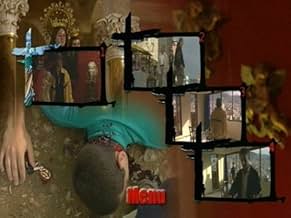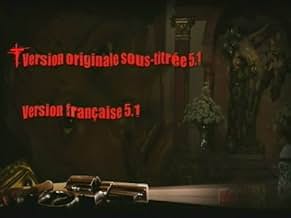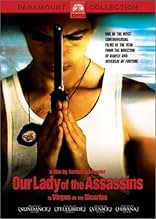IMDb-BEWERTUNG
6,8/10
4401
IHRE BEWERTUNG
Füge eine Handlung in deiner Sprache hinzuThe writer F. Vallejo returns to Medellin after an absence of over 30 years. He meets 16-year-old Alexis. Alexis is the kind of killer who knocks people off on command. The two are immediate... Alles lesenThe writer F. Vallejo returns to Medellin after an absence of over 30 years. He meets 16-year-old Alexis. Alexis is the kind of killer who knocks people off on command. The two are immediately attracted to each other.The writer F. Vallejo returns to Medellin after an absence of over 30 years. He meets 16-year-old Alexis. Alexis is the kind of killer who knocks people off on command. The two are immediately attracted to each other.
- Auszeichnungen
- 3 Gewinne & 3 Nominierungen insgesamt
Empfohlene Bewertungen
10jetwimp
A middle-aged Colombian writer, disgusted with life and contemptuous of religion, becomes involved sexually and romantically with teen-aged Medellin boys who kill effortlessly and with little provocation. At first appalled, he eventually grows addicted to the deaths the boys bring about, their magical ability to resolve the annoyances of everyday life, such as noisy neighbors and aggressive cab subway riders. The plot has some really astonishing surprises, and the taut nearly flawless script (in Spanish) is a treasure. The film , obviously the product of a philosophically inclined mind (Schroeder studied philosophy at the Sorbonne), is a thinking filmgoer's feast and works on many different levels. The main character's ambivalence about religion (the film's title, and the fact that the writer keeps finding himself in cathedrals) furnishes much matter for reflection. This film is not for everyone--- it is, even for these times, shocking. Those more comfortable with the blowsy and predictable product issuing from Hollywood committees should probably avoid it. But those who treasure the ability of film to explore provocative and original ideas will love it.
Hi, I was reading about the comments of the movie "La virgen de los sicarios"... some people think that there is bad acting in this movie, and i am disagree absolutely... I live in Cali, Colombia and i can assure you that what you see in the film is exactly what you can see in the real live in some poor parts of the colombian cities... i am talking about everything: the way people talk, the way they move, all is very real... if you live in this country, you can understand that the actors in the movie are not acting... they are living!!! because that what you see in the movie is what we are in Colombia. Thanks for your attention.
Our Lady of The Assassins will have you either loving it or hating it. It polarizes because it never compels as a movie itself, but is laid out before each person, needing him or her to internalize the film. The movie speaks of living in a Columbian drug town and the irony as people get shot everyday by moral-less teens set against the beautiful city and sky. But the main character, an old gay writer, is never engaging or as articulate and thoughtful as one would expect from the "best known grammarian" from Columbia. In fact, as grammar is rigidly structured, so are the writer's banal comments about 'time being what you want it to be' and 'life only being lived to die.' The musings have been heard before, but with greater clarity and depth. There is no epiphany to be associated with any of his sayings. However, he meets a young former gang member, marked for death, named Alexis and they fall in love. The film is so detached that their love is the closest element to emotion, and still one cannot understand why this boy would sleep with a man who incessantly whines constantly. The shocking life in Medellin is the most compelling aspect of the movie and the movie still has points, it's just that they are not nearly poignant enough. They are shown by the director, but never cohesively placed into an argument. I really wished I could have liked this movie.
Medellin is a dangerous city in more ways than one is lead to believe. At the time of the action, Pablo Escobar's empire has been dismantled and his loyal soldiers are scattered all around the city engaging in a game of death, revenge and petty vendettas. There is no reverence for life in a place that has seen violence on a daily basis and where children have access to guns for protection in order to survive in that environment.
Barbet Schroeder, the German director, expands on Fernando Vallejo's novel, which the author adapted for the screen, resulting in a highly violent and bloody film that is disturbing, as well as true.
Fernando, the older gay man who comes back to his native city of Medellin, quickly finds a boy to satisfy his needs. Alexis, the young man, is seen at first at the all-male brothel where he is offered by the pimp to Fernando. Alexis turns out to be something the older man didn't expect. This is a boy that is savvy in the ways of how to survive in the city, who clearly takes an interest in the older, and richer Fernando.
Alexis is a marked man and it's only a matter of time; his days are numbered because there are other youths behind him that will do whatever in their power to eliminate him. Fernando can't believe what his city has become, but he has no desire to go away again. When Alexis is killed, Fernando mourns his death until Wilmar, another young gay man appears in his orbit. Little prepares Fernando to realize who Wilmar is really.
Fernando's comments on the situation in his city, as well as in the Colombian reality, are the basic themes of the film. While one side of him cries for that old place he knew as a child, he welcomes this new metropolis full of danger and people that attracts and repulses him at the same time.
German Jaramillo appears to be the alter ego for the writer, Fernando Vallejo, whose story seems to resemble that of the Fernando in the novel and in the film. Mr. Jaramillo's take on Fernando keeps him away from the confrontations between his young lovers and what he thinks is right. He never passes judgment on what the young people are doing, yet he is instrumental for providing the bullets that Alexis needs to defend himself. The other two young actors, Anderson Ballesteros and Juan Diego Restrepo, play Alexis and Wilmar respectively.
Barbet Schroeder has directed the film with all its realism showing us a society in which all hope seems to have abandoned the citizens of the city.
Barbet Schroeder, the German director, expands on Fernando Vallejo's novel, which the author adapted for the screen, resulting in a highly violent and bloody film that is disturbing, as well as true.
Fernando, the older gay man who comes back to his native city of Medellin, quickly finds a boy to satisfy his needs. Alexis, the young man, is seen at first at the all-male brothel where he is offered by the pimp to Fernando. Alexis turns out to be something the older man didn't expect. This is a boy that is savvy in the ways of how to survive in the city, who clearly takes an interest in the older, and richer Fernando.
Alexis is a marked man and it's only a matter of time; his days are numbered because there are other youths behind him that will do whatever in their power to eliminate him. Fernando can't believe what his city has become, but he has no desire to go away again. When Alexis is killed, Fernando mourns his death until Wilmar, another young gay man appears in his orbit. Little prepares Fernando to realize who Wilmar is really.
Fernando's comments on the situation in his city, as well as in the Colombian reality, are the basic themes of the film. While one side of him cries for that old place he knew as a child, he welcomes this new metropolis full of danger and people that attracts and repulses him at the same time.
German Jaramillo appears to be the alter ego for the writer, Fernando Vallejo, whose story seems to resemble that of the Fernando in the novel and in the film. Mr. Jaramillo's take on Fernando keeps him away from the confrontations between his young lovers and what he thinks is right. He never passes judgment on what the young people are doing, yet he is instrumental for providing the bullets that Alexis needs to defend himself. The other two young actors, Anderson Ballesteros and Juan Diego Restrepo, play Alexis and Wilmar respectively.
Barbet Schroeder has directed the film with all its realism showing us a society in which all hope seems to have abandoned the citizens of the city.
I saw the film at the Jerusalem Film Festival. It was a rather late screening, but the viewers were glued to their seats. It's a very gripping movie and extremely subversive in themes, language and visuals. It's very anti current-day Colombia, and no wonder the production didn't go very smoothly. Still I admire the support the film got from `official' institutions in Medellion. It's subversive in themes, because we basically have a gay couple, an older man (about 40-50) who indulges in having sex with minor boys (who do this willingly, and yet, it's rather shocking to the average viewer) in return for financial support, or rather indulging the boys in whatever they want to do. The couple goes around the city and is critical of every facet of the city and rightly so yet the tone is overtly cynical and `evil'. The lead boy, Alexis, goes around and kills whomever is threatening him and his sugar-daddy I think he executed 4 people once a confrontation was about to happen, and 4 more were other kids who were after him. S this shooting spree is depicted in a somewhat accepting manner, as if this is the way to do these things in Colombia. They ridicule almost every aspect of life church, police, government, the drug lords, poor and beggars, the bourgeoisie, other gays, and even themselves. In that respect, it's a very Pasolini movie, although the realism here is a real one and not made for the sake of a socialist agenda. The writer and his two boy-lovers are very lost, although they always know where they are, and the ending is pretty bad, as expected. The film shows no hope for the Colombian people, as they are stuck in a country ran by corrupt officials, gangs and drug lords. The writer has great lines, one of my favorite was about him hating people who whistle, because they shouldn't try and imitate the art that was given to the birds
A good movie, with a 7/10 as far as I can say. Acting-wise since I don't speak Spanish, it was credible to my ears, though the boys did seem to quote their lines mechanically at times.
Wusstest du schon
- WissenswertesFilm debut of Anderson Ballesteros.
Top-Auswahl
Melde dich zum Bewerten an und greife auf die Watchlist für personalisierte Empfehlungen zu.
- How long is Our Lady of the Assassins?Powered by Alexa
Details
- Erscheinungsdatum
- Herkunftsländer
- Offizieller Standort
- Sprachen
- Auch bekannt als
- Our Lady of the Assassins
- Drehorte
- Produktionsfirmen
- Weitere beteiligte Unternehmen bei IMDbPro anzeigen
Box Office
- Bruttoertrag in den USA und Kanada
- 525.330 $
- Eröffnungswochenende in den USA und in Kanada
- 56.069 $
- 9. Sept. 2001
- Weltweiter Bruttoertrag
- 624.525 $
- Laufzeit1 Stunde 41 Minuten
- Farbe
- Sound-Mix
- Seitenverhältnis
- 1.78 : 1
Zu dieser Seite beitragen
Bearbeitung vorschlagen oder fehlenden Inhalt hinzufügen

























